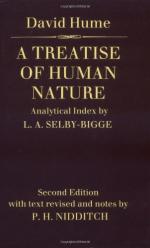|
This section contains 771 words (approx. 2 pages at 400 words per page) |

|
David Hume
David Hume (1711-1776) is one of the great philosophers of history, particularly within the empiricist tradition and the Scottish Enlightenment. He wrote broadly on matters ranging from epistemology, cognitive science, moral psychology, free will, personal identity, perception, morality, justice, virtue, history, specifically British history, economics, and philosophy of religion. He is the author of the Treatise of Human Nature. While Hume is not a character of the book, it really has no characters. The Treatise is not a narrative; it is a philosophical ... treatise. As the author, however, Hume's ideas and personality pervade the book.
Hume is a committed empiricist and sentimentalist. An empiricist holds that all substantive knowledge comes from experience or an inference from experience. As such Hume thinks that the senses are the source of all mental entities, impressions derived directly from the senses, ideas which represent impressions and the relations that obtain between...
|
This section contains 771 words (approx. 2 pages at 400 words per page) |

|




